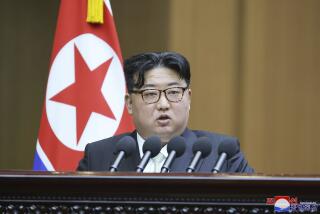An Outcry by Korean Christians
- Share via
Korean Christians in Southern California have raised an outcry over recommendations on the reunification of North and South Korea issued by a conference organized by the National Council of Churches.
The statement adopted at the April 23-26 conference in Washington, which included several North and South Korean pastors, said Americans should support proposals for withdrawal of U.S. troops and nuclear weapons from South Korea and should focus sympathetic attention on rallies and demonstrations by Korean people for peace and justice.
A committee formed in Los Angeles by prominent Korean-American pastors has drawn up a counterstatement declaring that no moves should be made to remove the U.S. military presence in South Korea “until North Korea gives up its ambition to reunify Korea under communist rule . . . and North Korea has churches all over the country and allows people to worship.”
Seen as Key Issue
“This is a major issue in the Korean community,” said Myung K. Kim, publisher of the weekly Korean-language Christian Herald in Los Angeles.
8,000 Signatures
About 8,000 signatures have been gathered endorsing the counterstatement from Korean-Americans living in Southern California, Kim said.
A protest march and demonstration are planned for Sunday afternoon in Koreatown, and a Korean Christian prayer rally in the Shrine Auditorium next Thursday, Friday and Saturday night will focus further attention on the issue, Kim said.
The April conference on Korean reunification did not make much news outside the Korean-American community except for the apparently unprecedented visit to the U.S. by a four-man church delegation from communist-ruled North Korea.
Heading the group of two pastors and two interpreters was the Rev. Ko Gi Jun, general secretary of the Korean Christians Federation, which he said represents 10,000 Christians in North Korea with the freedom to worship in about 500 “home churches.”
But three Korean Christian pastors interviewed this week in Los Angeles were skeptical. Reports from the Washington conference, at which delegates sang Korean hymns and read Scripture, indicated that “two of them could not sing the hymns at all and they did not seem to locate Bible passages very well,” according to the Rev. Dong Sun Lim, senior pastor of the large Oriental Mission Church in Los Angeles.
Head of Volunteer Group
Lim heads a Christian group that has volunteered to help establish churches in North Korea once freedom of religious expression is guaranteed by the government. Lim was to travel there recently as head of a 32-man delegation for that purpose, but he backed down because of insufficient assurances, he said. Nine members of the group decided to go as individuals, and recently returned.
“They asked to see just one of the 500 ‘underground’ churches and (North Korean officials) couldn’t show them any,” Lim said.
The Rev. Chun Il Cho, pastor of the Korean Philadelpia Presbyterian Church in Los Angeles, said the counterstatement was sponsored by the Council of Korean Churches in Southern California and the Southern California Korean Ministers Assn.
The positions taken by the National Council of Churches and its counterpart Council of Churches in South Korea are “minority” viewpoints both in South Korea and in this country, the Los Angeles pastors said.
“Until we see freedom of religion in North Korea and that church people can move freely from one country to the other, we would like to see (U.S. troops) kept in South Korea,” said the Rev. Sungsoo Whang, pastor of Los Angeles Presbyterian Church. Whang also said the April conference statement also would have the effect of inciting further agitation in South Korea, some of which he claimed was communist-inspired.
Minority Position
A National Council of Churches official conceded in a telephone interview that the conference took what is regarded as a minority position. “That is indisputable,” said Duane Epps, assistant general secretary for international affairs at the National Council headquarters in New York.
“But the church, when it has been effective in history, has done what the Gospel has mandated it to do, to be faithful to the message of love and reconciliation,” Epps said.
Epps felt that the rapport between the North Korean church representatives, South Korean churchmen and Korean-American delegates was warm and authentic. “It was a rather fundamental breakthrough,” he said.
Epps said that the Washington statement did not address the question of what needs to be done in North Korea to achieve reunification because “this particular conference was to discuss U.S. policy and the responsibility of U.S. churches vis-a-vis their government.” He said a more balanced policy statement on the Koreas, which formed the background to the conference, was adopted by the National Council of Churches Governing Board in 1986.
No Opposition Voiced
Two former moderators of the Korean Presbyterian Church in America, a National Council member since 1986, were present at the Washington conference “and did not indicate opposition to the statement,” Epps said.
The Los Angeles pastors said they did not know the opinions of those representatives, but suggested that Koreans customarily keep quiet about their objections in the face of an overwhelming consensus.
Whang added that the Rev. Keyong Kim, senior pastor of Young Nak Presbyterian Church, the largest congregation in that denomination, is one of the leading organizers of the petition drive to oppose the reunification conference statement.
More to Read
Sign up for Essential California
The most important California stories and recommendations in your inbox every morning.
You may occasionally receive promotional content from the Los Angeles Times.













